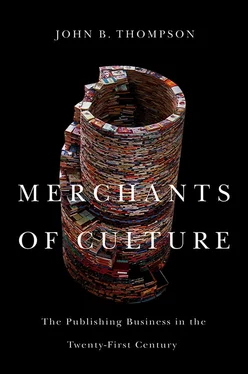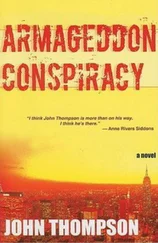1 ...8 9 10 12 13 14 ...22 These various sales and marketing activities are concerned not simply to bring a product to the marketplace and let retailers and consumers know that it is available: they seek, more fundamentally, to build a market for the book. To publish in the sense of making a book available to the public is easy – and never easier than it is today, when texts posted online could be said to be ‘published’ in some sense. But to publish in the sense of making a book known to the public , visible to them and attracting a sufficient quantum of their attention to encourage them to buy the book and perhaps even to read it, is extremely difficult – and never more difficult than it is today, when the sheer volume of content available to consumers and readers is enough to drown out even the most determined and well-resourced marketing effort. Good publishers – as one former publisher aptly put it – are market-makers in a world where it is attention, not content, that is scarce.
These six key functions of the publisher define the principal respects in which publishing firms ‘add value’. Whether these are functions that will always be performed by traditional publishing firms, or whether, in the changing information environment brought about by digitization and the internet, at least some of these functions will be eclipsed, marginalized, transformed or taken over by others, are questions to which there are, at this point in time, no clear answers. But before speculating about the imminent disintermediation of publishing firms, one would be well advised to reflect carefully on the functions actually performed by publishers in the cultural economy of the book, on which functions will continue to require fulfilment in the future and, if they do, on who will perform them and how.
There are three key developments that are crucial for understanding the logic of the field of trade publishing, and these will occupy our attention in the first three chapters: the growth of the retail chains and the broader and ongoing transformation of the retail environment of bookselling ( chapter 1); the rise of the literary agent as a key power broker in the field of English-language trade publishing ( chapter 2); and the emergence of transnational publishing corporations stemming from successive waves of mergers and acquisitions, beginning in the 1960s and continuing through to the present day ( chapter 3). I will seek to show how these three key developments have created a field that is structured in certain ways, a field that shapes the ways in which agents and organizations can act and that has certain consequences; chapters 4– 8examine these consequences. Taken together, this analysis of the key developments and their consequences will lay bare what I’m calling the logic of the field of English-language trade publishing. Chapter 9will examine the digital revolution and its implications for the book publishing industry, while chapter 10will offer a more normative reflection on the world of trade publishing and its costs. The concluding remarks will briefly consider some of the challenges the publishing industry faces as it enters the second decade of the twenty-first century.
In developing this account of the contemporary world of trade publishing in Britain and the United States, I rely largely on the insights gained through my interviews with practitioners in the field (a more detailed discussion of my research methods can be found in appendix 2). I also draw on data gathered by Nielsen BookScan, the Book Industry Study Group (BISG), Subtext and other sources. I make use of other studies and books on the book business when it is helpful to do so but I have generally found these to be of limited use for various reasons. The study carried out by Louis Coser, Charles Kadushin and Walter Powell, alluded to earlier, remains the best of these studies and an indispensable reference point for anyone interested in the modern book publishing industry. 12 But the research on which this study was based was carried out more than 30 years ago, in the late 1970s, and the world of publishing has changed quite profoundly since then. Moreover, this study was focused solely on the United States, and hence it lacks the more comparative and international perspective to which any study of the creative industries today, in our increasingly globalized world, must aspire. It is not without significance that, of the five largest publishing houses that are key players in the field of American trade publishing today, four are owned by large international media corporations which have substantial stakes in the UK, Europe and elsewhere.
At around the same time as the study by Coser and his colleagues appeared, Thomas Whiteside published a series of articles in the New Yorker, subsequently incorporated into a book, which cast a more critical eye on the world of New York trade publishing. 13 This was a time – around 1980 – when the takeover of many publishing houses by large corporations with diverse media interests was eliciting growing concern in many quarters about the possibility that the literary values associated with these houses were being eclipsed by the search for a new kind of lightweight, downmarket content that would be as suitable for TV talk shows and movie tie-ins as traditional books. Whiteside’s insightful analysis lends support to these concerns and highlights some of the key trends that have continued to shape the industry in the years since. But as with the work of Coser and his associates, the value of Whiteside’s study today is limited both by its age and by its exclusive focus on the United States. Moreover, the central theme of his critique – the idea that trade publishing was becoming part of a movie tie-in business in which the big Hollywood studios were increasingly calling the shots – now looks, with the benefit of hindsight, to be an exaggeration. It is undoubtedly true that movie tie-ins can be big business for trade publishers and can generate welcome spikes in sales, but movie tie-ins and the sale of movie rights have turned out to be less important for trade publishers than Whiteside thought. Other aspects of our contemporary media culture, such as the celebrity status and ‘well-knownness’ which stems from being seen and heard in the media, are more important for understanding the world of trade publishing than the links with the Hollywood movie business, or than the idea that books were becoming the ‘software’ of multimedia packages in an increasingly integrated communications–entertainment complex.
Apart from the studies by Coser et al. and Whiteside, many of the other books on the modern publishing industry that have appeared in the last decade or two have been books written by publishers themselves. The books by André Schiffrin and Jason Epstein, The Business of Books and Book Business respectively, are probably the most interesting recent examples of this genre. 14 Both Schiffrin and Epstein were distinguished publishers and editors in the world of American trade publishing – Schiffrin was the director of Pantheon for many years until he fell out with its corporate owners and resigned in 1989 to set up his own not-for-profit house called The New Press, while Epstein was editorial director at Random House for many years and enjoyed a long and distinguished career as one of America’s most successful editors. Their books are thoughtful reflections on the state of trade publishing in America at the turn of the millennium; they lived through and experienced personally the huge changes that have swept through the industry since the 1960s and 1970s, and their books bear witness to the scale and the costs – both in cultural and in personal terms – of these changes. But their accounts are inextricably entangled with their own personal experiences and career trajectories. These are not even-handed accounts of an industry undergoing dramatic change, nor do they purport to be: they are memoirs with a critical edge. They are personal and sometimes opinionated accounts – gracefully written, rich in anecdote, tinged with a shade of nostalgia – of an industry as seen from the particular perspectives of two protagonists who have charted their own courses through the complex and turbulent world of publishing. That the protagonists have charted their courses so successfully and recounted them so eloquently is a tribute to their remarkable talents as publishers and authors, but this does not alter the fact that their accounts are, by their very nature, partial. These books are symptoms and reflections of a world in change as much as they are analyses of it.
Читать дальше












